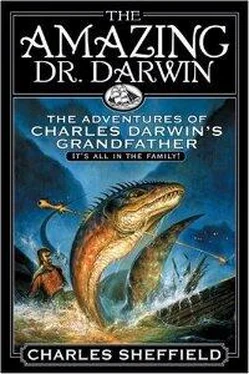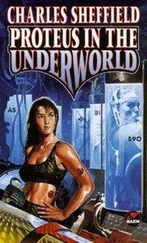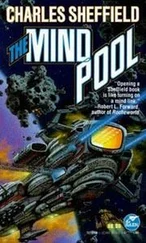“Looks as though they did, though,” said Pole. “We can settle that easily enough.”
He threw back his head. “Willy, where are you?”
The shout echoed through the whole house. After a few seconds there was an answering cry from upstairs.
“What’s wrong, Jacob? Do you need help there?”
“No. Has anybody been down here from upstairs, Willy? While I was gone, I mean.”
“No. I didn’t want to risk the sickness.”
“That sounds right,” grunted Pole. “Brave old Willy, hiding upstairs with his pipe and flagon.”
“Has anyone downstairs been using tobacco?” asked Darwin quietly.
“What?” Pole stared at him. “Tobacco?”
“Use your nose, man. Sniff the air in here.” Darwin was prowling forward. “There’s been a pipe alight here in the past quarter of an hour. Do you smell it now? I somehow doubt that it was the man’s wife that was smoking it.”
He walked forward to the cot itself and laid a plump hand flat upon it. “Quite cold. So here we are, but we find no dead man, and no dying man. Dr. Monkton, in your opinion how long did the stranger have to live?”
“Not long.” Monkton cleared his throat uncomfortably. “Not more than an hour or two, I would judge.”
“Within an hour of final sacrament, and then gone,” grunted Darwin. He shook his head and sat on the edge of the cot. “So now what? I don’t think we’ll find him easily, and we have all three sacrificed an evening to this already. If you are willing to waste a few more minutes, I’d much like to hear what the patient said when he became delirious. What do you say, gentlemen? May we discuss it?”
Pole and Monkton looked at each other.
“If you wish, although I am very doubtful that it—” began the physician, his rich voice raised a good half octave.
“All right,” interrupted Pole. “Let’s do it. But I don’t propose to debate this here, in the scullery. Let’s go upstairs. I’m sure Will Bailey can find us a comfortable place, and a glass as well if you want it—perhaps he can even find you an acceptable substitute for that rhubarb pie.” He turned to the other physician. “As you know, Dr. Monkton, when you were tending to the man I did little more than watch. With your leave, maybe I should say what I saw, and you can correct me as you see fit. Agreed?”
“Well, now, I don’t know. I’m not at all sure that I am willing to—”
“Splendid.” Jacob Pole picked up the lamp and started back along the corridor, leaving the others the choice of following or being left behind in darkness.
“Colonel Pole!” Monkton lost his dignity and scuttled after him, leaving Darwin, smiling to himself, to bring up the rear. “Slower there, Colonel. D’you want to see a broken leg in the dark here?”
“No. With two doctors to attend it, a broken leg would more than likely prove fatal.” But Pole slowed his steps and turned so that the lamp threw its beam back along the corridor. “What an evening. Will Bailey and I had just nicely settled in for a pipe of Virginia and a talk about old times—we were together at Pondicherry, and at the capture of Manila—when word came up from downstairs that Dr. Monkton needed another pair of hands to help.”
“Why not Will Bailey?” asked Darwin from behind him. “It is his house.”
“Aye, but Willy had shipped a few pints of porter, and I’d been running reasonable dry. I left him there to nod, and I came down.” Pole sniffed. “I’m no physician—you may have guessed that already—but when I saw our man back there in the scullery I could tell he was halfway to the hereafter. He was mumbling to himself, mumbling and muttering. It took me a few minutes to get the hang of his accent—Scots, and thick enough to cut. And he was all the time shivering and shaking, and muttering, muttering…”
* * *
The woman had been standing by the side of the cot, holding the man’s right hand in both of hers. As the hoarse voice grew louder and more distinct she leaned toward him.
“John, no. Don’t talk that way.” Her voice was frightened, and for a brief moment the man’s eyes seemed to flicker in their sunk pits, as though about to open. She looked nervously at Jacob Pole and at Dr. Monkton, who was preparing a poultice of kaolin and pressed herbs.
“His mind’s not there. He—he doesna’ know whut he’s sayin’. Hush, Johnnie, an’ lie quiet.”
“Inland from Handa Island, there by the Minch,” said the man suddenly, as though answering some unspoken question. “Aye, inside the loch. That’s where ye’ll find it.”
“Sh. Johnnie, now quiet ye.” She squeezed his hand gently, an attractive dark-haired woman bowed down with worry and work. “Try and sleep, John, ye need rest.”
The unshaven jaw was moving again, its dark bristles emphasizing the pale lips and waxen cheeks. Again the eyelids fluttered.
“Two hundred years,” he said in a creaking voice. “Two hundred years it lay there, an’ niver a mon suspected whut was in it. One o’ auld King Philip’s ships, an’ crammed. Aye, an’ not one to ken it ’til a month back, wi’ all the guid gold.”
Jacob Pole started forward, his thin face startled. The woman saw him move and shook her head.
“Sir, pay him no mind. He’s not wi’ us, he’s ramblin’ in the head.”
“Move back, then, and give me room,” said Monkton. His manner was brisk. “And if you, sir”—he nodded at Pole—“will hold his shoulders while I apply this to his chest. And you, my good woman, go off to the kitchen and bring more hot water. Perhaps this will give him ease.”
“I canna’ leave him noo.” The woman’s voice was anguished. “There’s no sayin’ whut he’ll come out with. He might—” Her voice trailed off under the doctor’s glare and she picked up the big brass bowl and reluctantly crept out. Jacob Pole took the man firmly by the shoulders, leaning forward to assure his grip.
“Inland from Handa Island,” said the man after a few seconds. His breath caught and rattled in his throat, but there seemed to be a tone of a confidence shared. “Aye, ye have it to rights, a wee bit north of Malkirk, at the entrance there of Loch Malkirk. A rare find. But we’ll need equipment to take it, ’tis twenty feet down, an’ bullion weighs heavy. An’ there’s the Devil to worrit about. Need help…”
His voice faded and he groaned as the hot poultice was applied to his bare chest. His hands twitched, flew feebly upwards toward his throat, and then flopped back to his sides.
“Hold him,” said Monkton. “There’s a new fit coming.”
“I have him.” Pole’s voice was quiet and he was leaning close to the man, watching the pallid lips. “Easy, Johnnie.”
The dark head was turning to and fro on the folded blanket, grunting with some inner turmoil. The thin hands began to clench and unclench.
“Go south for it.” The words were little more than a whisper. “That’s it, have to go south. Ye know the position here in the Highlands, but we’ll have to have weapons. Ye canna’ fight the Devil wi’ just dirks and muskets, ye need a regular bombard. I’ve seen it—bigger than leviathan, taller than Foinaven, an’ strong as Fingal. Five men killed, an’ three more crippled, an’ nothin’ to show for it.”
“It’s coming,” said Monkton suddenly. “He’s stiffening in the limbs.”
The breath was coming harder in the taut throat. “Go get the weapons… wi’out that we’ll lose more o’ the clansmen. Weapons, put by Loch Malkirk, an’ raise the bullion… canna’ fight the Devil… wi’ just dirks. Aye, I’ll do it… south, then. Need weapons… bigger than leviathan…”
As the voice faded, his thin hands moved up to clasp Pole’s restraining hands and Pole winced as black fingernails dug deep into his wrists.
Читать дальше












